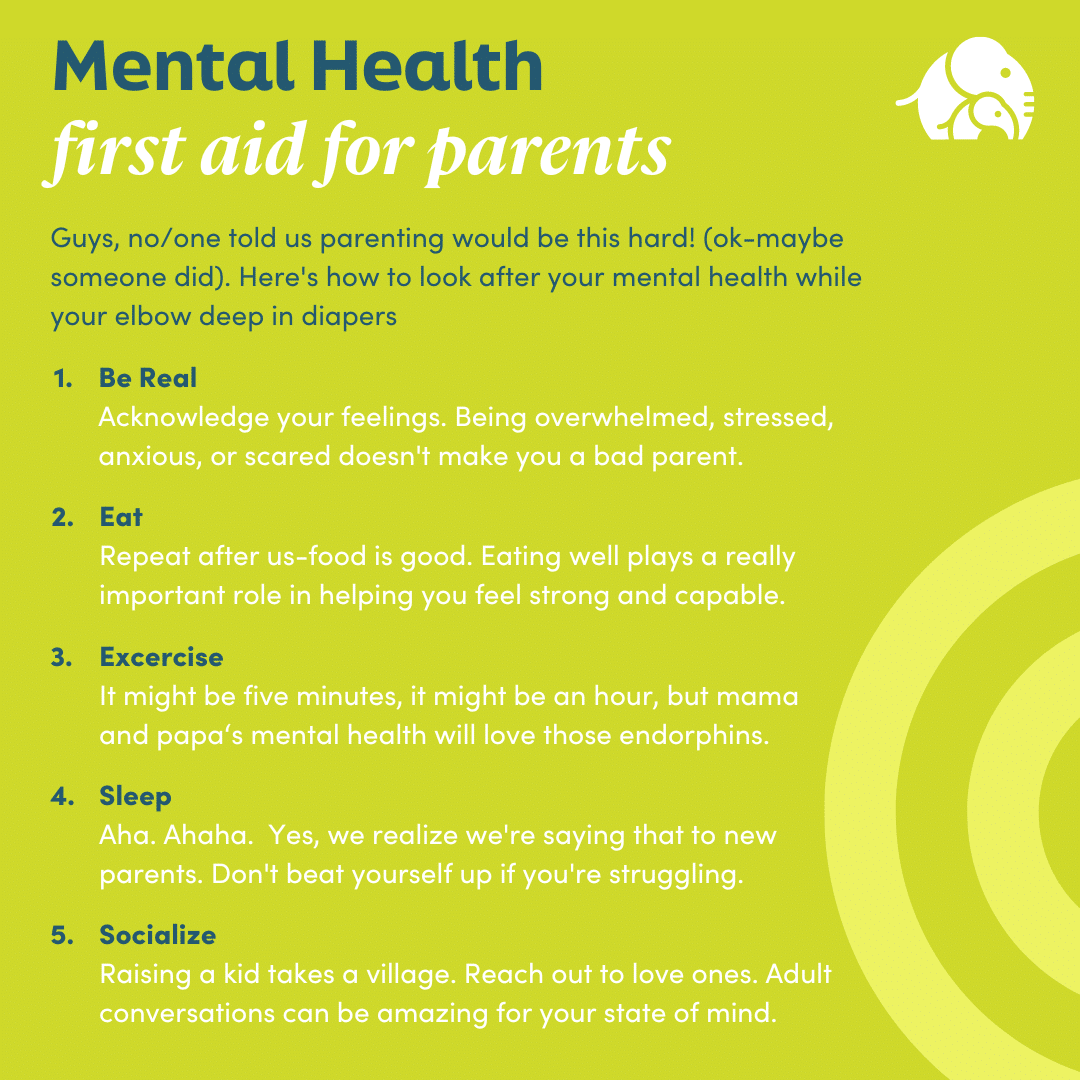If you’re reading this at 3:25am, feeding your beautiful new baby for what feels like the hundredth time tonight and trying to remember when you last showered, you’re in good company. Keeping a tiny human alive is a rollercoaster and every new parent can relate to the ups and downs. (We can also relate to living on Pop Tarts and wearing the same pajama pants for two weeks straight.)
They say it takes a village to raise a child, but it also takes a village to raise a parent. It’s hard work. It’s wonderful, terrifying, beautiful, stressful, awe-inspiring, and anxiety-inducing all at once. On top of those wild emotions, it also comes with serious sleep deprivation and significant life changes. And the truth is, when we welcome new babies into the world, none of us have a clue what we’re doing.
It’s okay if you’re not okay. Because remember, rollercoaster seats come in pairs, which means you never have to ride alone. Your partner might be able to help you, your family might be able to help you, your friends might be able to help you, and a therapist might be able to help you too.

Here are seven ways new parents can benefit from counseling.
Want to debrief to someone who gets it? Get matched with a therapist near you today!
1. Baby Blues
Let’s start with the period immediately after your bundle of joy arrives. POW! HORMONES!
Anyone who has given birth knows that what it does to your body – before, during, and after – is wild. It’s very common to experience the “baby blues” while you’re adjusting to parenthood, which is characterized by symptoms such as anxiety, overwhelm, sadness, irritability, crying, reduced appetite, and inability to sleep. It typically starts after delivery and can last up to two weeks.
However, in some people it can develop into a more severe and long-lasting condition known as postpartum depression (or PPD). This can pop-up during pregnancy or even up to a year after your baby arrives. It can present with symptoms such as severe mood swings, difficulty bonding with your baby, fear, guilt, shame, anger, feelings of worthlessness, overwhelming fatigue, and more. These symptoms are most common in new mothers, but it can actually affect new fathers as well.
This is one reason why counseling for new parents is so important. A therapist can support you while you’re processing all of these thoughts and feelings. They can also help you develop a treatment plan – which may include medication – that will help keep your head above water.
2. Missing Instinct
Some people seem to take to parenting like ducks to water. They seem to thrive on raising a little one, cherishing every moment, every memory, and every minute spent with their child. Others find themselves staring at the small and mysterious creature in their arms, feeling absolutely bewildered and searching desperately for something – anything – that will stop the seemingly endless crying.
Right off the bat, we’re going to remind you that social media is not real life, and if you’re looking enviously at a cute photo of a cute baby in a cute outfit, it probably took multiple tries and resulted in a huge pile of teeny-tiny baby laundry covered in spit-up. One a serious note, however, if you feel like you’re missing the parenting instinct, you’re definitely not alone. Were you actually meant to be a parent? Or did you just start a family because it seemed like the next logical step in your life? Are you ever going to be any good at it? Will your child miss out because this isn’t coming naturally?
That’s a lot to process! The fact that these questions are keeping you up at night is a sign that you’re already a great parent – you’re doing everything you can to give your new baby an amazing life. That said, counseling for new parents can help you work through your fears and get into the groove.
3. Sleep Anxiety
When was the last time you got a full night of sleep? If you’re in the trenches of late-night feeds and constant diaper changes, it’s probably been a while. Even if your baby sleeps well, you might find that your struggle to switch your brain off. And the more you think about how little sleep you’ve had, the more elusive it becomes. You know you need to get some rest, but you don’t know how.
Lots of things can contribute to insomnia, but it’s likely that anxiety is playing a big part, resulting in an unending train of thoughts you can’t control. If this is you, talking to a therapist can help, because counseling for new parents will help you work through the things that are on your mind, learn to let go of the things you can’t control, and find some new strategies to channel Sleeping Beauty.
4. Career Remorse
Choo choo! The career train is departing… and is it leaving without you? This is a huge issue for many new parents and it disproportionately affects the one who has given birth. First you have to tell your workplace that you’re pregnant, then your need time off for labor and delivery, then you may take a few days/weeks/months/years away from work to care for your new arrival. If you want to give your baby a sibling, you’ll have to rinse and repeat the entire process, leaving another gap in your career.
We’ve all seen the statistics around women in the workplace. We know that time out of the labor market impacts their careers. We know there is stigma around hiring women of child-bearing age. We know that women earn less than men. We know that when mothers return to the workforce their careers and earning potential often plateau or even diminish. It’s a lot to process. What have you done? Will you ever catch up? Why do you find yourself blaming your partner or your kids?
These are some very fertile fields for discussion and one of the reasons counseling for new parents is so important. Many people struggle with a changing sense of identity after becoming parents, and therapy can help as you redefine who you are and what you want out of life and work.
5. Parental Guilt
Parenting and guilt go hand-in-hand. You might feel guilty about what your baby is eating. Guilty about how your baby is sleeping. Guilty about how you’re spending time with your baby. Guilty about not being as present as you’d like. Guilty about not knowing as much as you wish you did. Guilty about going back to work. Guilty for lying to your child to get them to do something that will ultimately benefit them. Guilty about asking for help. Guilty for abandoning your partner.
That’s heavy. Even if you tell yourself that what you’re doing is totally normal and talk yourself around to feeling okay again, a different form of guilty can rear its ugly head and weigh you down again. Truthfully, you have enough on your plate without having to divert valuable mental energy to the guilt monster. Counseling for new parents is a great way to process this because it provides you with a safe environment to unload all of the guilt and shame you’re carrying around.
6. Restoring Intimacy
If you’ve had a baby, there’s a reasonable chance you can’t even think about this yet. All of your energy is going towards keeping your child alive, so you just might not have the bandwidth. When intimacy does eventually make its way back into the realm of possibility, things will have changed. Pregnancy changes your body. Exhaustion changes your brain. Parenting changes your priorities.
If you’re freaking out, you’re not feeling ready, you’re worried that you can’t give your partner what they need, or you have other concerns, reach out to a therapist. Counseling for new parents isn’t limited to talking about your baby – it can also include couple’s therapy, which is a really effective way to reconnect with your partner and find some ways to reignite the sparks between you.
7. Unpacking Baggage
Finally, lots of us are still carrying some baggage from our own childhoods. That’s just part of being human: we all inevitably fall and have to get back up again. The trouble is it’s really easy to transfer the insecurities we pick up along the way onto our kids, which is another reason why counseling for new parents is so important. As you start unpacking your own baggage, your therapist will be able to help you the identify behaviors and thought patterns you’ve developed that aren’t serving you well, so you can develop the strategies you need to replace them with healthier alternatives.
If you want to raise healthy kids, it’s important to demonstrate healthy behaviors. For example, if they see you eat fresh fruit, they’re more likely to eat fresh fruit. If they see you exercise, they’re more likely to exercise. If they see you engage in self-care, they’re more likely to engage in self-care. It’s the circle of life (*cue The Lion King*): a process of learning, unlearning, and relearning.
Counseling for new parents is a great way to set your kids (and yourself) up for success.
No-one gets a parenting instruction manual, but that’s okay. The team of experts from Ellie Mental Health can guide you in your journey. Find a therapist near you today.


